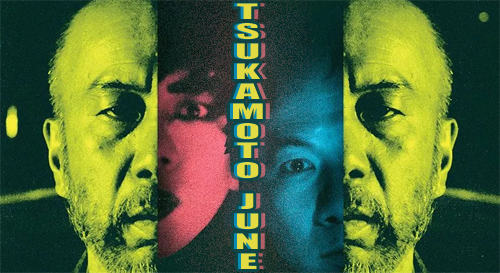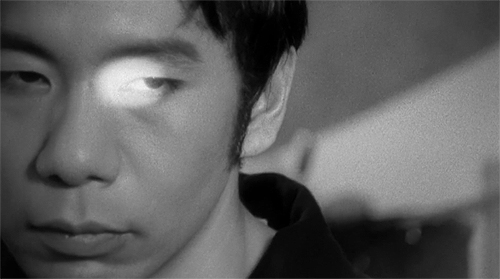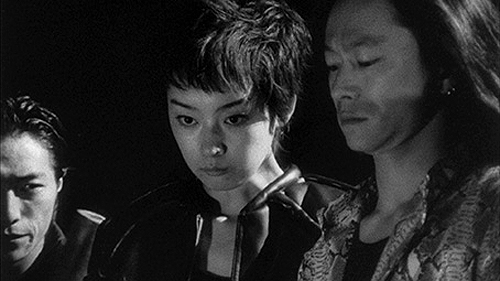Bullet Ballet (1998)
Directed by: Shinya Tsukamoto
Written by: Shinya Tsukamoto
Starring: Kirina Mano, Shinya Tsukamoto, Takahiro Murase

Available now on Blu-ray and on VOD from Arrow Films
One day I hope to enjoy life with even a small amount of the insane energy found in the 16mm films of Shinya Tsukamoto. Which is a strange thing to consider in a story like this which seems preoccupied not with the meaning of life, but that of death and destruction. To some readers the title may suggest an action film because of the way this phrase is associated with Hong Kong cinema, but the reality is less straightforward. It’s true that there are guns, there are gangs, and there’s an overall punk sensibility to many sequences. But this is also a melancholy drama about obsession, in which characters are frequently found meditating on the right way to die.

Goda, (Shinya Tsukamoto) an advertisement director for a corporation, comes home to find that his long term girlfriend has shot herself in the head. He’s racked with guilt because they never married after ten years, and he didn’t acknowledge her troubled side in all this time. But soon it becomes less about her death and more about the gun itself. How did she even come to own it? In a compulsive frenzy he scours the streets of Tokyo to buy a copy of this ‘Chief Special’ revolver, and later even tries to fashion his own weapon out of other parts. Frustrated by his own incompetence he sits alone staring at the hole in his apartment window left by the suicide. His only release comes from making a film in which the bullets from a similar firearm cause large scale annihilation.
He doesn’t understand death, and he doesn’t understand the night dwellers of the city who con him at every opportunity. Instead he becomes fascinating with the idea of killing rather than the act itself, and the power weapons hold over people. Wandering the streets he comes across gang member Chisato (Kirina Mano). He recognises her because she makes money by feigning suicide at a railway station so that her saviours can be robbed by her boyfriend Goto (Takahiro Murase). Incapable of finding real justice he begins to focus on them as a form of revenge. He soon becomes entangled in the underworld, despite the fact that each action he takes seems to make things worse. There’s a lesson to be learned here, but he’s not getting the message quickly enough.
The gang itself is the other major element in the story, with the Goda, Chisato and Goto making a familiar central trio following Tokyo Fist. Eventually when a real gun does come into their possession the power dynamic is constantly shifting as they fight against rival hoodlums and amongst themselves. But none of them seem able to kill anyone and Chisato’s interest in dying is confused and immature. This inner turmoil pushes the narrative as things escalate and spiral out of their control. When Goda has the gun he seems more interested in re-directing Chisato’s life than finding answers. When Goto has the power he only causes destruction and the eventual downfall of his fellow street thugs, as his attempts to prove his self worth garner the attention of the Yakuza.

These personal struggles and this cycle of violence are shot in a stylish yet stark manner, as you might expect from the director at this stage. Like his earlier films made with this gritty film format the endless labyrinth of the city is almost a character in itself. There are callbacks to Tetsuo as well as the rock and roll dystopia of Ishii’s Burst City. Warfare between different underground factions is depicted as a brutal affair filled with swirling exhaust fumes and harsh lights. The scenery is often dripping with filthy basement water or condensation from boiling industrial steam. The chaos also becomes internal as line between Goda’s home movie and his state of mind start to collide. There’s certainly nothing glamorous about this depiction of youthful rebellion.
In some ways this idea of young minds being wasted is a central theme. Tsukamoto himself wanted to tell a story that would be informative to this demographic in some way. Despite the fact they would probably never listen. His character in the movie itself is an older man out of his depth in a world of night clubs and crime, but he still wants to help when things go sour. The dynamic between these age groups, in particular the way older authority figures want control of naive minds is also apparent. Despite her outward nihilism Chisato is essentially a child as she dances around Goda’s apartment in his absence. But whether she understands the value of life at the end isn’t clear, and what Goda has learned from the gang is ambiguous.
The film thankfully offers no clear cut answers to this dilemma, so it’s another interesting facet to the story. Perhaps the lessons that come from the barrel of a gun are the only ones that can truly be taught in the scabrous underbelly of a metropolis. But when the film is this dark the final conclusion of ‘choose life’ is a strong enough sentiment. Which it achieves without overt body horror or extreme fantasy sequences. In this way there are some parallels to Taxi Driver but it’s very much its own thing overall. The movie might not have that much more to say, and certain elements feel mildly repetitive towards the end of a meandering third act. But it’s often still a gripping take on the isolated vigilante and rival gang subgenres, amongst its many other inclusions.
Rating: 









Be sure to check out the other reviews in this series


Be the first to comment